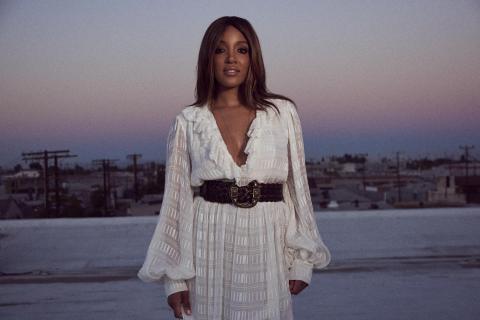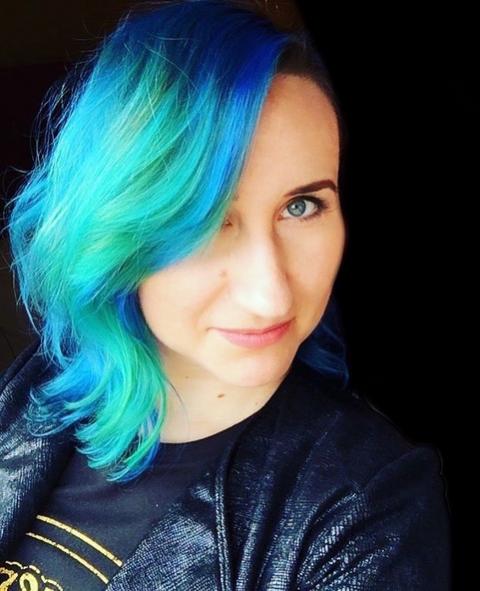'Black People Are Country': Mickey Guyton, with Karen Kosowski, Shares Insights with Berklee Students

Mickey Guyton
Image courtesy of the artist
Country singer Mickey Guyton says she tried for years to break into the tight-knit Nashville music industry, but it wasn’t until she embraced what made her different that her star started to rise.
Karen Kosowski
Last week, she and her songwriting partner and producer Karen Kosowski appeared at a virtual Berklee Visiting Artist Series clinic, moderated by Berklee voice instructor Lydia Harrell. Over the course of an hour, the three women, joined by students at the end, talked about Guyton and Kosowski’s collaboration, about the lines between genres, and about what it’s like being a Black woman in country music. Below are edited excerpts from those conversations.
On Sexism in Nashville
Karen Kosowski: I wasn’t aware of any overt sexism. I feel like I was actually very inspired and nurtured by a lot of different producers and engineers that I would come into contact with over the years...but I will say that something I have noticed is [that] when I’ll go to a trade conference...and I’ll be wandering around on the convention floor...I’ll walk up to a manufacturer and I’ll ask them about a compressor, or whatever piece of gear it is, and they start answering the question but they start talking to the [man I’m with].
Mickey Guyton: There are a lot of female songwriters that are incredible songwriters that don’t get to go out on the road to write with these other guys. First of all, because they can’t bro out on the bus with them, or, obviously, their wives don’t feel comfortable with them on the road, and so it prevents them from getting in certain rooms with certain artists.
On Being a Black Woman in Country Music
Guyton: It’s hard…. For some reason we’re just put in this one little box...that we’re supposed to fit in and we’re supposed to sing R&B music or rap, that’s where we belong: "Stay there, where we feel comfortable with you there." Even putting a song out on the radio, it was overly scrutinized: "We have to make sure you sound really, really country, because people are going to think that you’re not genuine." In reality, I grew up on gravel dirt roads, and the neighborhood I grew up in was right next door to former president George Bush’s ranch. So I’m pretty freaking country. And Black people are country; Black people are pretty freaking country. I don’t know why people just don’t associate that.
[At the same time,] you would have all these different artists—Sam Hunt, whomever—with trap beats in their songs, and flat-billed hats, and Timbalands...and their songs are just flying up the charts...yet I’m told I’m not country enough.
On the Stereotype of Bigotry in Country Music
Guyton: You hear it a lot from people that don’t understand. The industry is very, very difficult to break into. However, there are such good people, like Karen Kosowski, that is an outsider of Nashville, per se, that is making her own way in this genre. So I do have to defend it because I do know that there are people out there that really do want diversity in country music. [The president of a major label] has championed me for so long, a White woman, and said, "Your music is so important." So I do have to try to break down the system but also defend the system because there are really good people.
On Boundaries Between Genres
Guyton: Genres, for some reason, put these limitations on who you can be as an artist, but that’s not artistry. Artistry is getting in a room and writing something that just feels good to you, that you don’t really think about. Maybe later you eventually are like, "Okay, let me hone this in a little bit," but when you’re initially writing I don’t think you put those limitations on you.
On Guyton and Kosowski’s Approach to Songwriting
Guyton: Songwriting is a hard thing. I think for us...it starts with a concept and an idea, and then that’s when we start filling in the lyrics like a puzzle, later. It always starts first and foremost with an idea, and a discussion. A lot of times we sit around and we’re talking. When we wrote “What Are You Going to Tell Her?” we talked for probably an hour, two hours, before we even started writing the song. And then the idea came...the lyrics started kind of just coming out in a conversation.
On Why Guyton Tweeted “Stop Asking for Permission to Be Great”
Guyton: Rock bottom, honestly, pushed me into that direction. I’ve been in this industry for a very long time. Country music is one of the hardest genres to break into. There’s so many rules, there’s so many steps you need to take.
My husband was the one who actually called me out on it. I asked him, "Why is country music not working out for me?" and he said, "Because you’re running away from everything that makes you different...." And I had to look at that and be thankful [that] I’m who I am, and appreciate where I’ve come from, and my stories. And that’s what country music is: It’s your own personal truth; it’s your own stories...so I have to write from my own experiences, and my own experiences are I’m a Black woman, I grew up in the church, my grandmother loved Dolly Parton, I love country music, and that’s who I am.
